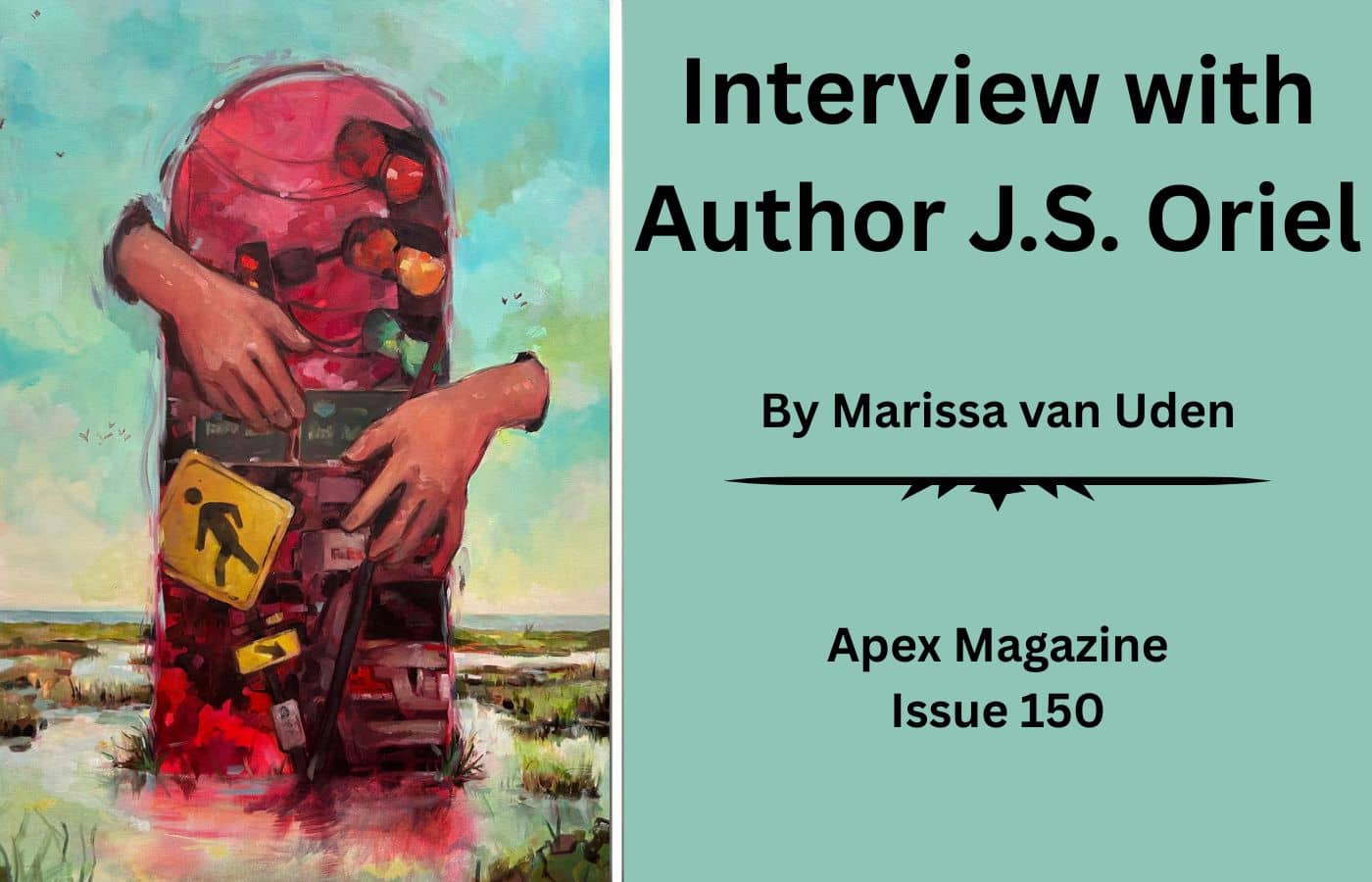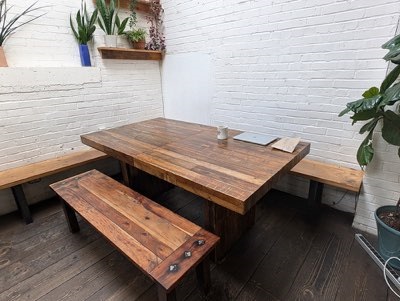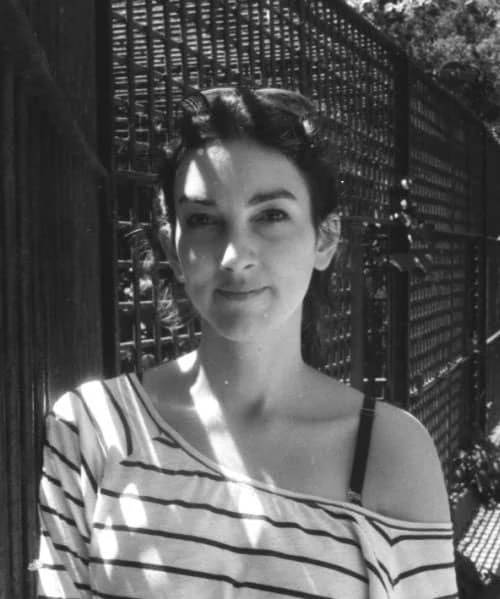
In the darkly delightful “Orion and His Moon” by J. S. Oriel, a sentient supply ship who just wants to do things right is forced to go off-course to check on a distant human colony that might be in trouble. His only companions on this long journey are his organs, which are also sentient. However, one organ named Moon is a little unruly and more independent than the rest, which really bugs him. Moon also seems to know more about Orion and his history than he knows about himself, which only unsettles him further. He tries to block out Moon’s ideas and focus on their mission, but as they work together on their very long journey, their relationship begins to change.
J.S. Oriel lives and writes from the watershed of the Anacostia River. Her first short story was published by Apex Magazine. You can find her at jsoriel.com.
Marissa van Uden: Thanks for joining us to chat today! I have to say, I loved this story so much. I’m always sucker for a sentient ship, but Orion and his Moon were instant favorites. The way you portrayed Orion’s relationship with himself and with his organs was so fun to read. Was it hard to get his voice just right, or did that evolve naturally?
J.S. Oriel: Thank you, Marissa! I love when I finish an Apex story and get to click over to one of your interviews, like getting to sit down with friends and dig into their latest creation. So, I’m completely starstruck to be here! Orion’s voice was very loud in my head from the beginning. Initially, I experimented with first person and thought, no, this guy’s too much, I need some space. I’m a slow drafter—I first started writing this story in 2023—so we had to spend a lot of time together.
The hardest balance was conveying the alien way Orion relates to his body and the world around him without just … alienating. Most of my revisions focused on creating more footholds for the reader to climb on board for the ride.
MVU: Aw, thank you! I’m so glad you enjoy the interviews. I thought that blend of the alien and familiar with Orion was so well done. The characters and relationships give this story such a warm feeling, which is perfectly juxtaposed with the horrors of space and some absolutely wild and twisted scenes. So now I have to ask, how did you come up with the idea for the birth scenes?
JSO: A bit of background: Orion is named after Project Orion, an effort in the 1950s and ‘60s to develop space flight propelled by nuclear explosions rather than chemical rockets. I love these weird little chapters of the Cold War, when people were dreaming up spaceships popping out nuclear bombs and sailing away on the blasts. The project eventually died after the signing of the Partial Nuclear Test Ban Treaty, which, among other useful things, prohibits nuclear detonations in space.
So the process of Orion’s reproduction was always part of my plan for the story in a mechanical sense. In an emotional sense? That was not on my roadmap. A bit more background: professionally, I’m a social scientist who works on nuclear nonproliferation and disarmament. I spend a lot of my life thinking about nuclear weapons, which feels normal to me, but upon reflection I realize it’s pretty grim.
When I started drafting the birth of Orion’s nuclear child, revulsion and dread just boiled out of me. Maybe that reaction came from my own feelings about nuclear weapons. Or my feelings about birth. I grew up—and many of my loved ones remain —in what is now a forced-birth state. Wherever it came from, it surprised me, but I decided to lean into it and see where it took the story. Ultimately, I liked the dissonant emotional complexity it gives Orion, who considers himself to be meticulous and controlled in his thinking, but who also experiences this primal, shattering fear as a regular part of functioning.
MVU: I agree—it echoes the dissonance humans have to experience in so many ways when we have no choice but to submit to our physical body and just be a mammal. On the subject of their relationship, did you always know how Orion and Moon’s friendship was going to turn out, or was that something you had to write your way to? How different is the published version to the first draft?
JSO: The first seed of “Orion and His Moon” came from a class with Sarah Pinsker on generating story ideas. I had just finished reading an excellent book, The Mountain in the Sea by Ray Nayler, about a marine biologist who encounters emerging civilization in a colony of octopi. It had me thinking about octopus intelligence, how a being with multiple brains and decentralized intelligence might experience the concept of ‘self.’ So I set out to write a buddy road trip in space to explore that idea. Orion and Moon’s relationship, the way we hone our understanding of ‘self’ by exposure to ‘other,’ was where I started. Their friendship also became a reflection on authoritarianism—how even the most restrictive and controlling systems can’t always prevent us from doing what our enormous, malleable brains were built to do, which is to innovate and question and connect to one another.
I rarely start writing a story until I have a strong sense of its trajectory. The first and final draft of “Orion and His Moon” have all the same bones. What’s different is the amount of connective tissue making sense of everything. For that, I owe the mentors, friends, and family who subject themselves to my early drafts and help me figure out what’s not coming through. This is a consistent challenge for me! Luckily, I have a lot of brilliant, patient, and supportive people in my community.

Supervisor Leona, sleeping on the job.
MVU: I was so surprised to see this is your first publication! This story is not only brilliantly written and super compelling, but the voice feels so confident. How long have you been writing? And what are your favorite ways to hone and develop your craft?
JSO: When I was in elementary school, a friend and I wrote stories together by sending letters back and forth in the mail (it was the late nineties, and our parents were scared to let us have email addresses). I had mostly stopped working on fiction around the time I went to university, but I returned to writing in 2019. My dad was dying from late-stage colon cancer, and I had left my job and moved back home to help him through palliative treatment. Writing gave me something else to think about for a little while, a way to feel like I could still grow and learn and change.
As far as developing craft goes, I love when I’m able to join classes and workshops. So many writers and editors are generous with sharing their earned wisdom, and it’s energizing to dive deeply into a specific facet of craft. I’ve benefitted a lot from workshops with small groups. And not just from the feedback I received on my own work, but also from working with other writers on their projects. There’s so much to learn by deeply and thoughtfully examining another writer’s work, understanding where they want to go with a story, and exploring the mechanics for getting there together. I always keep an eye open for critique partners and other ways to build community with other writers.
MVU: I’m so sorry to hear about your dad, and very glad you returned to writing. Can you share a bit about your childhood: where did you grow up, and were there any artists around who inspired you to become a storyteller? What was your path to writing?
JSO: I came to writing the most common way, I think, through an obsession with reading. I grew up in San Antonio, absorbing books or whining to be taken to the library. My mom was my enabler. One day in fourth grade, with no warning, she picked me up early from school. Had I forgotten a doctor’s appointment? Nope! She informed me that we were driving all the way to Austin to meet Brian Jacques, one of my childhood heroes, at a book signing. At the time, I thought my mom was the coolest ever. I didn’t know anyone else who got to ditch school to do things like that. Looking back, I see how she encouraged me to leap at opportunity and grow in every direction I wanted. Needless to say, I still think my mom is the coolest ever. And she still reads everything I write, even though—and I cannot emphasize this enough— my stories are far from her usual tastes.

The table in the coffee shop where JS wrote most of “Orion and His Moon”
MVU: I agree, she is! What books or other works of art would you say most influence your writing style, either from childhood or more recent?
JSO: I’m sure just about everything I read, see, or watch touches my stories in some way. Of course, I love speculative fiction, but I think it’s valuable to read more widely than you write. Recently I finished the hilarious and heart-wrenching Galápagos by Kurt Vonnegut. I’m in the middle of Coffeeland: One Man's Dark Empire and the Making of Our Favorite Drug by Augustine Sedgewick, a nonfiction book with surprising narrative heft. These days I’m also setting aside plenty of time to bully my friends into watching Severance with me!
MVU: Can you tell us about your ideal creative day: when and where do you write, and do you have any particular rituals you do to get into the right mindset? Do you write to music or silence?
JSO: I wish I had an answer to this question! I’m constantly wrestling with my ADHD brain to accomplish anything resembling a habit or routine. I do see trends, at least. I’m more likely to be creative early in the morning, when I have a maximum amount of optimism about the day ahead of me. I need to block off enough time to really relax and focus, and sometimes it helps to change environments. Best of all is writing with other people. I drafted most of “Orion and His Moon” at a coffee shop where I join friends on Sunday mornings to write. I meet another group of friends virtually—we met during a workshop!—on Wednesday nights.
I’ve learned that spending time in a flow state creating stories is so important to my general sense of happiness and wellbeing. I have to be really protective of that joy. It’s so easy for writers to lapse into guilt and anxiety about their productivity—Am I doing enough? Am I doing it well enough? Trading joy for fear, trading connection for competition, that’s such a lousy deal. So I try to accept that I write as I can, when I can. The value for me is what I get out of the process, not the outcome. As a friend wisely put it, I want to “treat my creativity like a partner, not a tool.”

Supervisor Leona keeping a close eye on things. This is how she spends a lot of her waking hours.
MVU: Love these strategies, and protecting that flow-state time is so essential with ADHD! What are your other passions, hobbies, or favorite ways to relax when you’re not writing?
JSO: At some point during the pandemic, I read an article about sea glass. Apparently, the Chesapeake Bay is an unusually good place to search for cobalt-colored sea glass, a rare variety, because a factory in Baltimore produced it for medicine bottles. I live relatively close to the Chesapeake Bay and thought it sounded nice to spend a few hours walking the shore, searching for little blue specks of local history. It was all so harmless at first.
Soon my area of interest widened. I was looking for sea glass in Maine. Texas. California. My sister sent me some interesting pieces she found on a trip to Alaska. At a work retreat, my boss brought me a few more that she came across in Europe. My partner lives in the UK; suddenly we are spending our holidays together on the northeastern shore of England, at the site of a Victorian-era bottle works factory, raking in huge gleaming pearls of century-old glass on a freezing beach in January.
Now I have about twenty pounds of sea glass bagged up in the corner of my room. Everyone asks me, what are you going to do with it? I have absolutely no idea. I just like finding it.
MVU: Wow, I’m so glad I asked that question. People have the most fascinating hobbies! I also love to ask authors to share a charity that’s meaningful to them. Is there one you’d like to boost today?
JSO: I appreciate that so much! We’ve talked a bit about fictional nuclear detonations in space, so I’ll highlight the thousands of nonfictional nuclear detonations that have happened on our planet, largely on colonized and Indigenous land. Hundreds of thousands of people have been harmed by nuclear testing and use. Even though the Cold War feels like a closed chapter, people are still dying today because of the contaminants released by nuclear detonations.
The International Campaign to Abolish Nuclear Weapons (ICAN) is a civil society coalition that won a Nobel Peace Prize for their role in supporting the Treaty on the Prohibition of Nuclear Weapons. The treaty, which is just a few years old, is the first comprehensive legal prohibition of nuclear weapons, and it also contains obligations to help the people hurt and the places contaminated by nuclear blasts. For folks in the US like me, organizations like the Tularosa Basin Downwinders Consortium and Tewa Women United advocate for communities near nuclear testing sites in the Southwestern US.
MVU: Amazing, thank you! Okay, last question: What are you working on at the moment? And do you have any other stories coming out in the near future? I have no doubt readers will be wanting to track down more of your work!
JSO: I always have a few short story ideas percolating, but right now I’ve switched gears to work on a novel-length project. It’s a second-world fantasy set at the remote edge of a frigid desert, and it explores some themes in common with most of my work: the relationship between memory and identity, on both an individual and societal level; how history and justice intersect—and how they don’t. I hope anyone who is interested in my work will have more to read someday soon!










